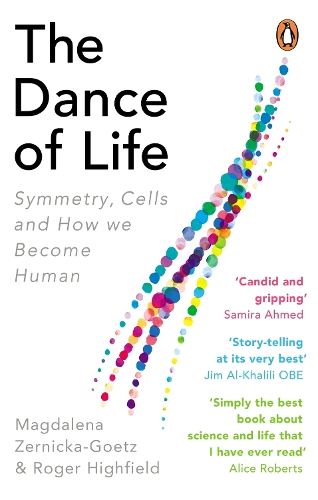
The Dance of Life: Symmetry, Cells and How We Become Human
(Paperback)
Publishing Details
The Dance of Life: Symmetry, Cells and How We Become Human
By (Author) Magdalena Zernicka-Goetz
By (author) Roger Highfield
Ebury Publishing
W H Allen
30th March 2021
28th January 2021
United Kingdom
Classifications
General
Non Fiction
Embryology
Popular science
612.64
Physical Properties
Paperback
304
Width 127mm, Height 197mm, Spine 18mm
208g
Description
A journey into the new frontier of how a single fertilised egg becomes a complex human being 'Quite simply the best book about science and life that I have ever read' - Alice Roberts How does life begin What drives a newly fertilized egg to keep dividing and growing until it becomes 40 trillion cells, a greater number than stars in the galaxy How do these cells know how to make a human, from lips to heart to toes How does your body build itself Magdalena Zernicka-Goetz was pregnant at 42 when a routine genetic test came back with that dreaded word- abnormal. A quarter of sampled cells contained abnormalities and she was warned her baby had an increased risk of being miscarried or born with birth defects. Six months later she gave birth to a healthy baby boy and her research on mice embryos went on to prove that - as she had suspected - the embryo has an amazing and previously unknown ability to correct abnormal cells at an early stage of its development. The Dance of Life will take you inside the incredible world of life just as it begins and reveal the wonder of the earliest and most profound moments in how we become human. Through Magda's trailblazing research as a professor at Cambridge - where she has doubled the survival time of human embryos in the laboratory, and made the first artificial embryo-like structures from stem cells - you'll discover how early life is programmed to repair and organise itself, what this means for the future of pregnancy, and how we might one day solve IVF disorders, prevent miscarriages and learn more about the dance of life as it starts to take shape. The Dance of Life is a moving celebration of the balletic beauty of life's beginnings.
Reviews
One of the World's Top 10 Thinkers of 2020 -- Prospect
Quite simply the best book about science and life that I have ever read * Alice Roberts *
How an entire human can emerge from a single cell is one of the great mysteries of life. This book is a wonderful exposition of that amazingly complicated process, and combines Zernicka-Goetzs research and expert perspective with the clear and engaging narrative that is a hallmark of Highfields science writing * Venki Ramakrishnan, President of the Royal Society and Nobel-prize winning scientist *
A touching, detailed portrait of a life in science. Beautifully written, its a reminder that scientists are human and their humanity affects every part of their work * Angela Saini, bestselling author of INFERIOR and SUPERIOR *
How does a single fertilised egg know how to develop into the trillions of different cells that making up a human This book provides you with much more than the answer it is story-telling at its very best. Together with Highfield, Zernicka-Goetz leads us through her life scientific, intertwining the exciting field of 21st biology with a joyous personal journey of discovery at the cutting edge of research * Jim Al-Khalili *
Author Bio
Magdalena Zernicka-Goetz (Author) Magdalena Zernicka-Goetz moved to Cambridge 23 years ago from Poland, and is now a professor at the University of Cambridge, where she runs a laboratory and leads a team of 17 postdoctoral scientists and graduate students. She is also a Wellcome Trust Fellow and Visiting Professor at Caltech. She has published more than 120 papers, lectured all over the world and received numerous awards and honours. Her work on embryos won the people's vote for scientific breakthrough of the year in Science magazine. Roger Highfield (Author) Roger Highfield is an author, journalist, broadcaster, and Science Director at the Science Museum Group. He is a member of the Medical Research Council and Visiting Professor of Public Engagement at the University of Oxford and University College London. Prior to his work at the Science Museum Group, he was the editor of New Scientist and the science editor of the Daily Telegraph. He has written or co-authored eight popular science books, and edited J. Craig Venter's autobiography,A Life Decoded (Allen Lane/Viking, 2007), which was shortlisted for the Royal Society's Science Book Prize.
